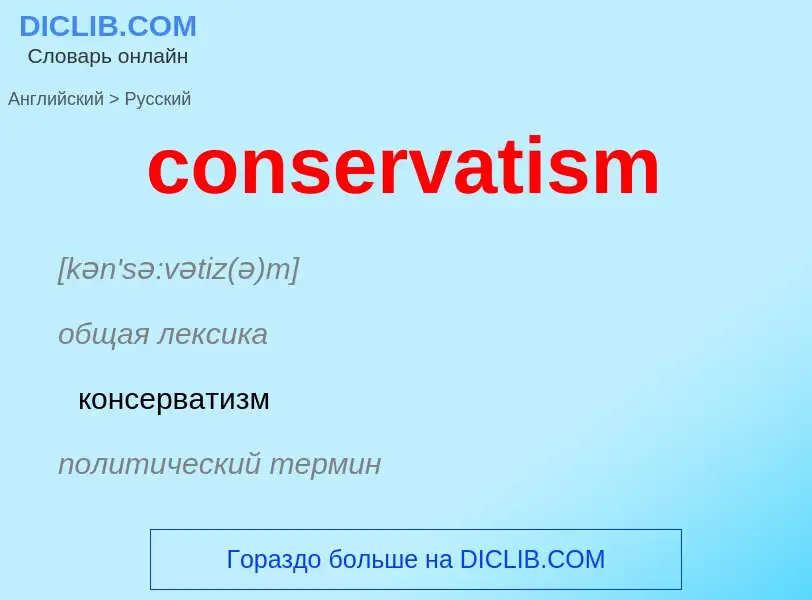Перевод и анализ слов искусственным интеллектом ChatGPT
На этой странице Вы можете получить подробный анализ слова или словосочетания, произведенный с помощью лучшей на сегодняшний день технологии искусственного интеллекта:
- как употребляется слово
- частота употребления
- используется оно чаще в устной или письменной речи
- варианты перевода слова
- примеры употребления (несколько фраз с переводом)
- этимология
conservatism - перевод на Английский
[kən'sə:vətiz(ə)m]
общая лексика
консерватизм
политический термин
(идеология, ценностями которой являются индивидуализм и минимальное вмешательство политической власти в дела экономики и общества; идеология сохранения существующего положения вещей и традиционной морали)
бухгалтерский учет
принцип консерватизма [осторожности] (требование, согласно которому активы должны скорее недооцениваться, а обязательства переоцениваться; соответственно расходы и обязательства должны признаваться как можно раньше, а доходы и активы - как можно позже, что приводит к занижению отчетной прибыли)
синоним
Смотрите также
существительное
общая лексика
консерватизм
(Conservatism) принципы и политика консервативной партии (особ. Великобритании)
специальный термин
устойчивость свойств
Определение
Википедия
Conservatism is a cultural, social, and political philosophy that seeks to promote and to preserve traditional institutions, practices, and values. The central tenets of conservatism may vary in relation to the culture and civilization in which it appears. In Western culture, depending on the particular nation, conservatives seek to promote a range of social institutions such as the nuclear family, organized religion, the military, property rights, and monarchy. Conservatives tend to favor institutions and practices that guarantee stability and evolved gradually. Adherents of conservatism often oppose certain aspects of modernity (for example mass culture and secularism) and seek a return to traditional values, though different groups of conservatives may choose different traditional values to preserve.
The first established use of the term in a political context originated in 1818 with François-René de Chateaubriand during the period of Bourbon Restoration that sought to roll back the policies of the French Revolution. Historically associated with right-wing politics, the term has since been used to describe a wide range of views. There is no single set of policies regarded as conservative because the meaning of conservatism depends on what is considered traditional in a given place and time. Conservative thought has varied considerably as it has adapted itself to existing traditions and national cultures. For example, some conservatives advocate for greater economic intervention, while others advocate for a more laissez faire free-market economic system. Thus, conservatives from different parts of the world—each upholding their respective traditions—may disagree on a wide range of issues. Edmund Burke, an 18th-century politician who opposed the French Revolution but supported the American Revolution, is credited as one of the main theorists of conservatism in the 1790s.

![[[European People's Party]] (EPP) Congress in [[Bucharest]] in 2012, whose three conservative leaders in the EPP included [[Prime Minister of Spain]] [[Mariano Rajoy]] (2011–2018), [[Chancellor of Germany]] [[Angela Merkel]] and [[Prime Minister of Hungary]] [[Viktor Orbán]] [[European People's Party]] (EPP) Congress in [[Bucharest]] in 2012, whose three conservative leaders in the EPP included [[Prime Minister of Spain]] [[Mariano Rajoy]] (2011–2018), [[Chancellor of Germany]] [[Angela Merkel]] and [[Prime Minister of Hungary]] [[Viktor Orbán]]](https://commons.wikimedia.org/wiki/Special:FilePath/Angela Merkel (9307204896).jpg?width=200)
![[[Joseph de Maistre]] (1753–1821) [[Joseph de Maistre]] (1753–1821)](https://commons.wikimedia.org/wiki/Special:FilePath/Cogordan - Joseph de Maistre, 1894 (page 12 crop).jpg?width=200)
![Chamber of Deputies]], in 2004 Chamber of Deputies]], in 2004](https://commons.wikimedia.org/wiki/Special:FilePath/Gianfranco Fini 2004.jpg?width=200)
![Kingdom of Hungary]] from 1920 to 1944 Kingdom of Hungary]] from 1920 to 1944](https://commons.wikimedia.org/wiki/Special:FilePath/Horthy the regent.jpg?width=200)
![[[Jair Bolsonaro]], the former President of Brazil, known for his conservative stances [[Jair Bolsonaro]], the former President of Brazil, known for his conservative stances](https://commons.wikimedia.org/wiki/Special:FilePath/Jair Bolsonaro 2020 (cropped 2).jpg?width=200)
![March for Life]] in [[Paris]], [[France]] March for Life]] in [[Paris]], [[France]]](https://commons.wikimedia.org/wiki/Special:FilePath/Marche pour la vie 2012 - 6.jpg?width=200)
![[[Margaret Thatcher]] (1925–2013), under whose leadership the Conservative Party has shifted their economic policies to the right as well as [[Thatcherism]] [[Margaret Thatcher]] (1925–2013), under whose leadership the Conservative Party has shifted their economic policies to the right as well as [[Thatcherism]]](https://commons.wikimedia.org/wiki/Special:FilePath/Margaret Thatcher stock portrait (cropped).jpg?width=200)
![[[President of the United States]] [[Ronald Reagan]] (1981–1989), whose [[Reagan Doctrine]] has reshaped the Republican Party [[President of the United States]] [[Ronald Reagan]] (1981–1989), whose [[Reagan Doctrine]] has reshaped the Republican Party](https://commons.wikimedia.org/wiki/Special:FilePath/President Ronald Reagan at a Rally for Senator David Durenberger in Minneapolis, Minnesota (cropped).jpg?width=200)
![[[Rishi Sunak]], the current prime minister of the United Kingdom [[Rishi Sunak]], the current prime minister of the United Kingdom](https://commons.wikimedia.org/wiki/Special:FilePath/Rishi Sunak and Jane Hartley (cropped).jpg?width=200)
